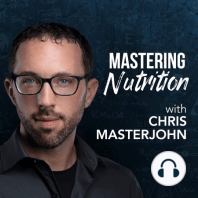22 min listen

Should You Do CrossFit on a Ketogenic Diet? | Mastering Nutrition #16
Should You Do CrossFit on a Ketogenic Diet? | Mastering Nutrition #16
ratings:
Length:
33 minutes
Released:
Jul 25, 2016
Format:
Podcast episode
Description
In this episode, I give my take on a recent masters thesis paper by Rachel Gregory from James Madison University, which reports a study where just under 30 members of Rocktown CrossFit and Sports Performance were randomized to do CrossFit for six weeks with a normal diet or a low-carbohydrate ketogenic diet. The ketogenic diet led to weight loss and loss of bodyfat without hurting the performance on a 6-7-minute for-time workout-of-the-day (WOD)-style test involving a 500-meter row, 40 bodyweight squats, 30 ab mat situps, 20 hand-release pushups, and 10 pullups. Herein, I explain why I think this study does show that the average person can lose weight and get fit with this method, but why it doesn't really get to the heart of the questions I would be interested in, which are these: how would a ketogenic diet impact maximal performance on weight-lifting sets of 5-12 reps, or in sports involving short bursts of energy such as football, basketball, baseball, soccer, and tennis, and do the hormonal adaptations to the diet ultimately have the potential for negative impacts on thyroid hormone, cortisol, LDL-cholesterol, and sex hormones? In this episode you will find all of the following and more: The protocol of the study; changes in caloric intake, body weight and body composition; why the ketogenic diet's spontaneous decrease in calories can easily be explained by the effect of variety restriction on food reward, as Stephan Guyenet has explained well over at Whole Health Source; the changes in performance that occurred; how carbs, fat, and creatine impact the three energy systems of phosphagen or creatine phosphate, anaerobic glycolysis, and oxidative phosphorylation; why carbohydrate intake would primarily impact maximal performance at tasks requiring 15-90 seconds of intense work rather than a 6-7 minute WOD; why the ability to raise a 5RM to a new PR in trained subjects would have been a better question to address these concerns; why most team sports would also fall into this category; why free T3 (fT3), cortisol, LDL-C, and sex hormones (testosterone, estrogen, progesterone, etc) should be examined; and why how full your "stress bucket" (allostatic load) is will most likely be the ultimate determinant of whether these hormonal systems are negatively affected.
Released:
Jul 25, 2016
Format:
Podcast episode
Titles in the series (100)
001: Coffee: Why I drink coffee and won't apologize for it, but why I'm skeptical of the large body of literature associating coffee consumption with reduced disease risk. Do we drink coffee by choice? Sort of. I discuss why our genes may play a role in our coffee... by Mastering Nutrition